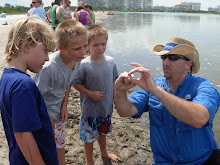Do you boat in Collier County? Do you remember receiving a survey from Florida Sea Grant in 2008/2009 asking about your boating destinations, activity prefernces, etc? The information you provided was for a study characterizing the boating activities of recrerational boaters in the County's coastal waters. Below is an overview of the study and its importance.
Why was this study conducted? Collier County faces the difficult yet critical challenge of sustaining economic viability while maintaining the integrity of its coastal environmental resources. Waterway access improvements and recreational boating needs figure prominently within this multifaceted challenge. To meet the challenge, the County recognizes the need for pertinent and accurate information concerning on-water activities that is obtained using the best technology and scientific methods. To accomplish this undertaking, the Florida Sea Grant CollegeProgram in conjunction with the Florida Fish and WildlifeConservation Commission, Collier County's Coastal Zone Management Department, and the University of Florida CollierCounty Cooperative Extension Program conducted a recreational boating characterization study from 2008 through 2009.
The goals of the study were to:
1)Determine the preferences, activities, and needs of boaters who use Collier County’s access facilities (including residential docks) and waterways, and
2) quantify and map their use of public access facilities and waterways over the course of a year.
How was the study implemented?
 The input of boaters was important and, therefore, a map-based mail survey was conducted. Vessel, vehicle, and boat trailer registration numbers were collected at area marinas and boat ramps over the course of a year and used to obtain boaters’ names and mailing addresses from the State’s Vessel Title Registration System (VTRS). The names and mailing addresses of Collier County boaters who lived on the waterfront were obtained from County tax records and compared to the VTRS. To adequately capture seasonal variations in boating patterns and activities, three waves of the map-based questionnaire were mailed to boaters: the first in the summer of 2008, the second in the fall/winter of 2008-09, and the third in spring 2009. A random sample of 7,700 boaters received the map-based questionnaire and 2,057 of them completed and returned it. On the map, survey recipients marked the origins of their two most recent recreational boating trips in Collier County, drew their associated travel routes, and identified boating destinations and primary activities they engaged in along these routes. They also marked areas of perceived congestion and where they would like additional access to waterways. In addition, descriptive data about their trips, including preferences for selecting trip departure sites, destinations, and travel routes, favorite
The input of boaters was important and, therefore, a map-based mail survey was conducted. Vessel, vehicle, and boat trailer registration numbers were collected at area marinas and boat ramps over the course of a year and used to obtain boaters’ names and mailing addresses from the State’s Vessel Title Registration System (VTRS). The names and mailing addresses of Collier County boaters who lived on the waterfront were obtained from County tax records and compared to the VTRS. To adequately capture seasonal variations in boating patterns and activities, three waves of the map-based questionnaire were mailed to boaters: the first in the summer of 2008, the second in the fall/winter of 2008-09, and the third in spring 2009. A random sample of 7,700 boaters received the map-based questionnaire and 2,057 of them completed and returned it. On the map, survey recipients marked the origins of their two most recent recreational boating trips in Collier County, drew their associated travel routes, and identified boating destinations and primary activities they engaged in along these routes. They also marked areas of perceived congestion and where they would like additional access to waterways. In addition, descriptive data about their trips, including preferences for selecting trip departure sites, destinations, and travel routes, favorite activities, vessel types, and the timing, duration, and frequency of trips was collected and linked to the mapped data.
What kind of information was generated from the study? 1. Characteristics of boaters who use Collier County waterways for recreation
2. A profile of the types of recreational vessels that are used on Collier County waterways
3. A description of the types of recreational activities that occur on Collier County waterways
4. A description of waterway access facility amenities preferred by boaters
5. A summary of principal waterway-related problems and needs as perceived by boaters
6. Spatial data formatted within a GIS that can be used to map: (i.e. service areas for Collier County boating facilities, departure or launch sites, water-based boating destinations and associated activities, trip routes that define where boaters travel on the water, areas of perceived waterway congestion, areas where additional waterway access is desired
Why is this study important?
As demand for the use of Florida’s waterways increases, so does the need for enhanced public access, public safety, and environmental protection. There is, however, little information available to resource managers and planners that describes the preferences and use patterns of the boating community. Information obtained from this study can enhance resource management and planning applications, and contribute to educational products that can improve boating experiences and encourage resource stewardship.Potential applications include:
- Categorization and spatial representation of boater departure sites, routes, and destinations to address community concerns regarding waterway access, maintenance, signage, and facility sitings
- Comparison of boating information with other spatial (GIS) data layers (for example, environmental features, development patterns) to help guide resource and public safety management





No comments:
Post a Comment